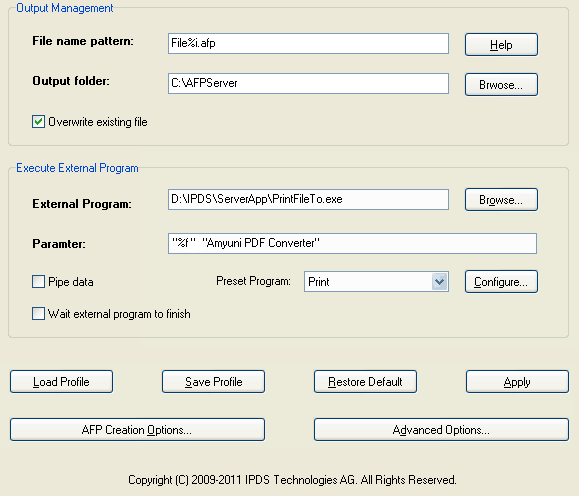You can specify the file name and file extension. For example,
File%i.afp mandates AFP Printer to generate the following files,
File0001.afp
File0002.afp
.
.
.
File0009.afp
.
.
.
File9999.afp
Here is the complete syntax,
Field format: %[width][.start]type
width = 0..9 ('i' fields) or 0..99 (other fields).
Default width is 4 for 'i' type field and 0 for others.
Strings are right padded with spaces, numbers are left padded with zeroes.
Negative width swaps padding.
start = first used number (only valid for 'i' field; default = 1)
type = field type code. One of:
i: auto-increment integer
y: year (2 digits)
Y: year (4 digits)
m: month number
M: month name
d: day number
D: day name
h: hour (12 hours)
H: hour (24 hours)
n: minutes
s: seconds
t: print job title
j: print job id
u: user name (who starts the print job)
c: computer name (from which came the print job)
Special "search fields" can be specified in this manner:
|literal|searchstring|
To use the '%' character in a filename, use the sequence '%%'.
Searchstring can contain wildcards.
The software will search for the "searchstring" while choosing the filename,
but then will use "literal" in the actual filename.
Here are more examples,
Examples:
file%i.afp
-> file0001.afp, file0002.afp, ...
export%Y-%m-%d-%6i.afp
-> export2010-12-25-000001.afp, export2010-12-25-000002.afp, ...
file.%u.%6.0i.afp
-> file.Administrator.000000.afp, file.Administrator.000001.afp, ...
file%i-page|%d|*|.afp
-> will examine any file in the form file%i-page*.afp
and then use the name file%i-page%d.afp. Note that
%i will be substituted with the first available integer,
while %d will be used literally.
